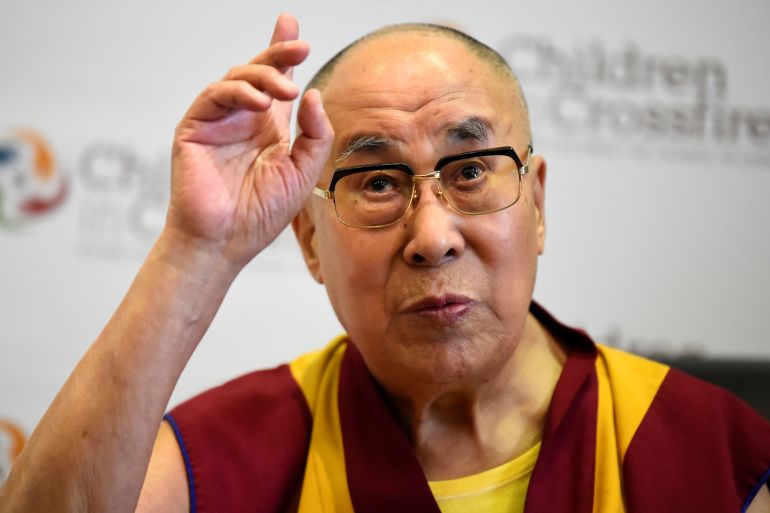Dalai Lama apologises after video asking boy to ‘suck my tongue’
A statement on Dalai Lama’s Twitter account says the leader often teases people he meets ‘in an innocent and playful way’.

The Tibetans’ spiritual leader, Dalai Lama, has apologised after footage showed him asking a young boy to “suck my tongue” at a public event in India.
“A video clip has been circulating that shows a recent meeting when a young boy asked His Holiness the Dalai Lama if he could give him a hug,” said a statement published on Monday on the exiled 87-year-old leader’s Twitter account, which has 19 million followers.
Keep reading
list of 3 itemsDeath toll in Tibet tunnel avalanche rises to 28
Home away from home: The untold story of Canada’s ‘Little Tibet’
“His Holiness wishes to apologise to the boy and his family, as well as his many friends across the world, for the hurt his words may have caused.”
Moreover, the post said, the Dalai Lama often teases people he meets “in an innocent and playful way, even in public and before cameras”.
— Dalai Lama (@DalaiLama) April 10, 2023
The video, which has one million views on Twitter, also shows the Nobel laureate apparently giving the boy a peck on the lips in the presence of an audience, heard clapping and laughing, while a man captures the moment on a phone.
Social media users slammed the video, calling it “disgusting” and “absolutely sick” after it started trending on Sunday.
“Utterly shocked to see this display by The Dalai Lama. In the past too, he’s had to apologise for his sexist comments. But saying – Now suck my tongue to a small boy is disgusting,” wrote user Sangita on Twitter.
In 2019, the Dalai Lama apologised for saying that if his successor were to be a woman, she would have to be “attractive”. The comments, which were criticised around the world, were made in an interview with the BBC.
The Dalai Lama, who fled to India in 1959 after a failed uprising against Chinese rule in Tibet, is regarded by Beijing as a “dangerous separatist”.
The Dalai Lama has made the Himalayan town of Dharamshala his headquarters since fleeing from Tibet after a failed uprising against Chinese rule in 1959. India considers Tibet to be part of China, though it hosts Tibetan exiles.
The Noble Peace Prize winner has worked for decades to draw global support for linguistic and cultural autonomy in his remote, mountainous homeland.